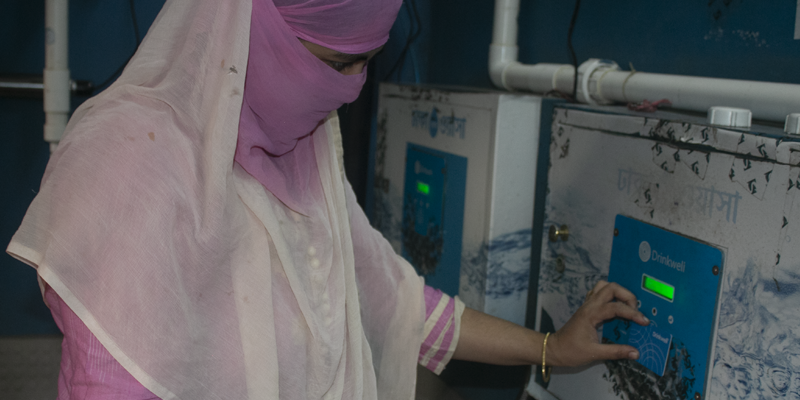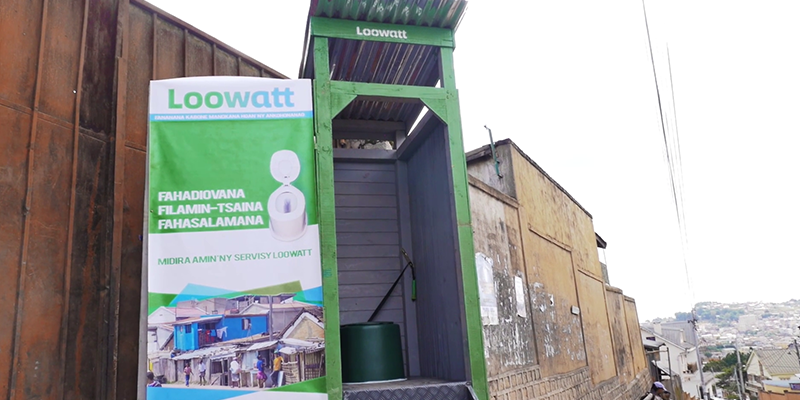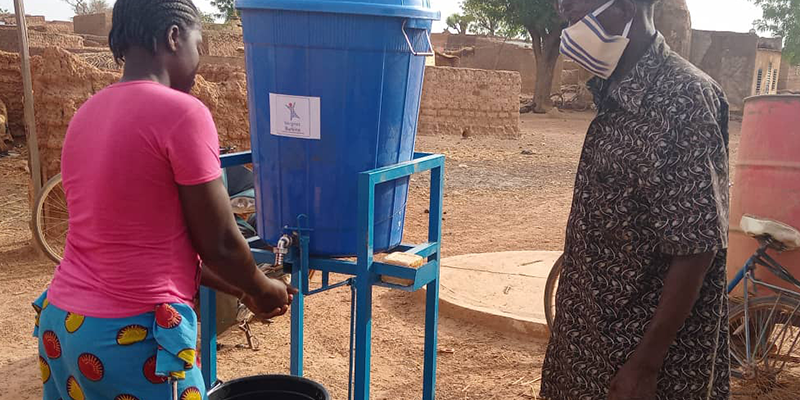This post is part of a blog series on funding provided by the UK Foreign, Commonwealth & Development Office (FCDO) that the GSMA awarded to nine previous grantees in the water, sanitation, education, health and food security sectors which enabled them to continue delivering essential services to customers following the outbreak of the COVID-19 pandemic. Here we look at some of the opportunities and challenges encountered by Drinkwell, Loowatt, Safe Water Network (SWN) and Uduma during the pandemic and consider how the grant funding supported them.
Water and sanitation providers were already in a precarious financial position before the pandemic. Based on IBNET data, only 35 per cent of water providers globally are generating sufficient revenue to cover operational and maintenance costs. Achieving financial sustainability is also a key challenge for sanitation providers looking to deliver services to the 2.5 billion people that still lack access to improved sanitation. The situation has been made tougher by the pandemic. Against the backdrop of needing to continue providing critical services to mitigate the spread of COVID-19, utilities and providers faced numerous other challenges, including the following:
- Reduced availability of critical supplies as a result of the disruption in supply chains and normal operating practices;
- Loss of revenue due to falling demand from business or a government mandate to provide water at no or a lower cost; and
- A need to defer investments because of the two reasons above, as well as the challenge of responding to the crisis.
To ease financial pressures, SWN secured additional funding, while Drinkwell explored new business opportunities
Many governments have mandated that water be provided for free at the point of delivery, such as in Ghana, where SWN builds and owns water treatment and distribution stations that integrate mobile payments, prepaid metering and machine-to-machine connectivity. Although SWN is reimbursed by the government for providing free water, there can be a delay in payments of several months, which creates cash flow issues. The financial challenges faced by SWN have been eased by the funding provided by the UK Foreign, Commonwealth & Development Office (FCDO), awarded by the GSMA, which helped the provider to keep its facilities open and undertake additional activities to maintain water quality.
The grant funding demonstrated the financial sustainability of SWN’s operations to other donors, which led to them providing incremental funding to support the water provider during the second half of 2020 as the free water mandate continued. SWN raised an additional $550,000 from donors such as Xylem Watermark, Aqua for All, Hilton Foundation, McKee Foundation and the Stone Family Foundation. Almost half the funding was spent on offsetting losses incurred as a result of the free water mandate. It also enabled SWN to scale up its household connections to more than 500 homes. This helped the water provider reduce social contact at water collection facilities, while also establishing a source of future revenue.

Drinkwell is another company that has looked to secure new revenues during the pandemic. The water provider supplies informal settlements with access to safe and affordable water via mobile-enabled water ATMs. This is most commonly achieved through public-private partnerships with local municipalities in Bangladesh. The municipal government provides Drinkwell access to land, as well as water and electricity sources, while Drinkwell attracts impact investment and grants to set up the water systems and dispense the water via a pay-as-you-go (PAYG) model. Following the temporary closure of Drinkwell’s water ATMs due to concerns around virus transmission, the water provider experienced short-term cash flow problems. It was important for Drinkwell to demonstrate its resilience to this financial shock in order to continue serving its existing customers and form new agreements to build water ATMs with municipalities in other regions. Over the course of the pandemic, Drinkwell and Chittagong Water Supply and Sewerage Authority (CWASA) formed a new partnership to set up four water ATMs in the city, while Drinkwell is also in discussion with other municipalities about forming partnerships to provide safe and affordable water.
Additionally, Drinkwell is establishing an entrepreneur-led model as an alternative to municipality partnerships. In this scenario, private entrepreneurs operate water ATMs that Drinkwell maintains on their behalf. With support from the Stone Family Foundation, Drinkwell has showcased this model in Gazipur, while talks continue with other private entrepreneurs about scaling the model across more cities in Bangladesh. The aim is for the private entrepreneur model to support Drinkwell’s revenue diversification by avoiding an over-reliance on particular clients and partnership models.
Drinkwell is also exploring new water delivery methods in response to changes in customer behaviour arising from the pandemic. Fears of contracting COVID-19 at water ATMs were seen as contributing factors to a year-on-year decline in water revenue at sites that were operational in both October 2019 and October 2020. As a result, Drinkwell is planning to introduce a door-stop water delivery service, whereby it will fill up and package the bottled water at its water ATMs then deliver it to customers. This allows people to access safe and affordable drinking water without having to leave their homes. The door-step water delivery service could also help Drinkwell to overcome some of the seasonality issues it faces; for example, the service could boost sales during the winter months when water consumption is typically lower. However, due to the difficulty of obtaining the regulatory permits required to set up the service in Dhaka, the door-step water delivery service will be limited to Chittagong and Gazipur for the time being.
Loowatt built new facilities to serve more customers throughout the pandemic
The grant funding also enabled Loowatt, which uses mobile technology to support the servicing and maintenance of waterless, container-based household toilets, to relocate its waste treatment site in Madagascar. Before the pandemic, Loowatt relied on state-owned facilities, but these facilities were not always operational. This prevented Loowatt from managing waste as well as generating incremental revenue by converting waste to fertiliser and energy. Through the grant, Loowatt opened its own waste management facility, giving the provider more independence and allowing it to process a higher volume of waste. Moreover, by positioning its waste management facility near dense urban areas, Loowatt can serve more households with its container-based solution.
Between July and December 2020, Loowatt increased its customer base from 223 to 443, driven by the provider’s marketing campaign which helped people to appreciate the value of private toilets, particularly during the pandemic. Loowatt aims to install at least 500 additional toilets by the end of 2021, while also upgrading old toilets to the latest model, which uses a more mechanised solution. This enables Loowatt to reduce maintenance costs and time spent collecting waste. The sanitation provider is in discussions with NGOs around potential partnerships and grant funding to finance these projects.
In the second half of 2020, 110 Loowatt customers used mobile money for the first time to pay for their services. This reflects the wider shift to digital payments as a safer and more accessible option during the pandemic, as well as the effect of policy measures introduced by regulators to accelerate the adoption of digital payments. The role of mobile money in helping water and sanitation providers reach more customers is a theme we explore in a separate blog in this series.

The pandemic delayed some of the expansion plans of water and sanitation providers
The water and sanitation providers that received grant funding through the project have taken several steps to scale their services amid the pandemic. However, they have encountered numerous challenges along the way. For example, the pandemic delayed Loowatt’s investment plans as it was not authorised to install new toilets between March and May 2020 owing to lockdown restrictions. Loowatt also faced other disruptions to its operations, such as delays in the shipment of toilets due to local and international COVID-19 restrictions and the closure of a supplier it used to construct toilet shelters in Madagascar. Other providers also faced delays in their expansion plans. Drinkwell had planned to open 300 new water ATMs in Dhaka in June 2020, but the project was delayed due to the pandemic. Drinkwell also encountered technical challenges that delayed the integration of mobile money services with water ATMs.
The pandemic was not the only obstacle to scaling up water services. Uduma distributes water via hand pumps and standpipes, which are managed by a digital prepayment and sales monitoring system. In Burkina Faso, the prolonged rainy season in 2020 prevented Uduma from accessing some local villages for two months, which delayed the installation of new water facilities. Increased rainfall also reduced demand for Uduma’s hand pumps and standpipes as more individuals collected rainwater for their domestic use. Uduma also experienced other challenges when expanding its operations in certain villages. For example, one of the villages in Midebdo refused Uduma’s water service because of a lack of trust in water institutions, stopping Uduma’s deployment in this location.

Scaling services to deliver long-term benefits
The pandemic has highlighted the importance of water and sanitation services to public health, while also shining a light on the number of people that still lack access to basic services. According to the WHO/UNICEF Joint Monitoring Programme report, in 2017 some two billion people lacked access to basic sanitation facilities, 1.4 billion people lacked access to basic hand-washing facilities and 785 million people lacked access to basic drinking water services.
Innovative service models – such as those adopted by Drinkwell, Loowatt, SWN and Uduma – have the potential to significantly improve the availability and sustainable management of water and sanitation services. However, this has been made more difficult by the pandemic, which has added to the financial pressures facing water and sanitation providers. The funding awarded by the GSMA, provided by the UK Foreign, Commonwealth & Development Office (FCDO), has played an important role in ensuring business continuity, while also allowing the water and sanitation providers to carry on pursuing new opportunities. The providers involved in the project explored alternative business models and formed new partnerships to deliver services to more of the population. Between July and December 2020, SWN increased its household connections to more than 500 homes, Loowatt delivered its container-based solution to a further 223 households, and Drinkwell opened new water ATMs outside of Dhaka. These represent important steps in slowing the spread of the virus, while also providing economic, health and environmental value that will persist beyond the crisis.
The Digital Utilities programme is funded by the UK Foreign, Commonwealth & Development Office (FCDO), and supported by the GSMA and its members.



